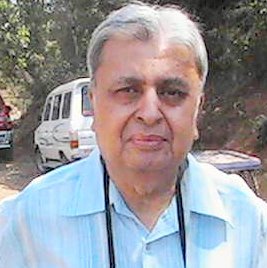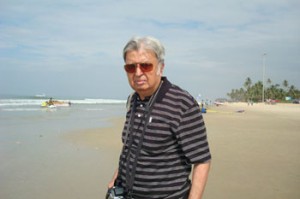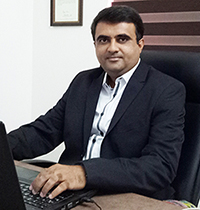
Tushar Bhatt, a versatile senior journalist.
Speakbindas interviews Tushar Bhatt ans asks him questions related to journalism and his personal life. Have a read.
Speakbindas
- Dear Tusharbhai, tell us something about your roots, your education.
Tushar Bhatt
- My roots are in the village middle class. I went to primary school at a remote village named Endhal in Gandevi taluka in south Gujarat. My biological mother ( I call her Devki mata) Bhadraben died of TB when I was three and just six months before the arrival in India of medicine to cure the disease. My father was a doctor himself and quite young. In the early months of 1941, they had eloped to get married against the wishes of my father’s family. He struggled for a few years to run his medical practice as well as raising me. But our meals were irregular,inadequate.
- Eventually, he got married to my Jasoda mata (Manjulaben) who raised me as lovingly as Bhadraben would have done. I went to high school in Gandevi, and after matriculation studied at first the Gujarat college and then at HK Arts in Ahmedabad for B.A.(Economics & Statistics). While I was studying my father gave up his medical practice because he could not be cruel and extract money from the poor.He had a flair for writing and was a voracious reader.Our home did not have many things but it always had a lot of books, ranging from novels to sociology to politics. When I was a child I had seen Das Capital by Marx. A loner from the early days, I never excelled in sports or school studies,but my general knowledge was considerable. I think I inherited from my father Late Dr. Shanker Bhatt, a habit to read anything and everything, not just novels. My father came to Ahmedabad and became a journalist, working in low salary Gujarati papers around 1957.
Speakbindas
- What made you jump into the field of journalism? Some kind of inspiration or what was the driving force?
Tushar Bhatt
- I suppose I merely followed him, but with an important difference. I decided to try my luck in better paying English journalism. We were a family of half-a-dozen and my father’s income was not enough. So while at college I went to work for two hours a day at Gujarat Vidpeeth for a princely sum of Rs.30 a month, then even before graduation I learnt typing and became a typist at the head office of the State Transport Corporation for Rs.120 a month. I joined morning HK Arts college, leaving home by 7 am, return at ten, eat hastily and go to ST. In the evening I worked as a trainee at the local news bureau of Indian Express, without any reward. On Sundays, I would go to college library to look after the reading room for a free-ship of Rs. 90 per half year. In 1961 I got a break. The Hindu, Madras appointed me as their Gujarat correspondent, and then came news agency UNI which gave me a full time job as a reporter and bureau chief. Salary was Rs. 220 a month. I covered Rajkot election in 1962 when Minoo Masani fighting on the Swatantra party ticket, defeated the Congress nominee. Somehow UNI report sent by me around one in the night got printed everywhere in the country. That was my first major success. In 1965, I went over to The Times of India, having been chosen one of the eight new journalists out of 8,000 applicants.
Speakbindas
- You have honored the editorial-chair for The Economic Times. Tell us about its journey. What skills it required from you, and how you handled the same?
Tushar Bhatt
- I have always kept in mind Mother Teresa’s words: “We do not do big things. We do small things with great care and affection.” Somehow I knew that all small things well done add up to big things. I had made up my mind to put in my best in whatever I do. Everything you do is worth doing well. In Times in those days new journalists, called trainee journalists would be confirmed at the end of a year, depending on their performance and aptitude. There were seven vacancies in various publications. I had studied economics but there was no opening immediately available. This did not mean the extra man would be thrown out. I was posted to library with an assignment to update obituaries which are kept ready for all VIPs. I did not mind because I believe that nothing you do in life is wasted. Within two months Lady Luck smiled. I was hastily shifted to The Economic Times in preparation for going to Ahmedabad, where Mr Ramu Patel, veteran newsman, had served a quit notice to launch his own paper.
- To be stationed away from the head office is an important milestone in my career because it taught me to take my own responsibility. Economic newspapers were new in the field of journalism and editors encouraged enthusiastic youngster to specialize. I did it in reporting on socio-economic changes. In those days, stock markets ruled the economic news but I started traveling to villages to write about changes in agriculture, consumer behaviour, consumption pattern, state of crafts. It got me several awards, including then newly instituted Chandrakant Vora award. Most of my career I wrote on economic affairs, but writing on politics was unavoidable because economic forces decide what happens in politics. I regularly wrote editorials for a long time. This is a job that calls for equanimity. There is no paper in the world that does not commit a mistake or two every day.
Speakbindas
- Which are the other publications you have worked for?
Tushar Bhatt
- From the ET I shifted to Business Standard, Calcutta, as special correspondent, then moved to The Telegraph, a new generation trail-blazing daily. I was so prolific from Ahmedabad that other correspondents complained to the editor that I was taking up too much space, leaving little room for their reports. I also wrote for Sunday magazine. In 1986, I shifted to Delhi as chief of news bureau of The Telegraph. I had a battery of young people, including girls, between 24 and 28 years competing with journalists above 50 in other papers. It was a highly productive and heavy work period. In late 1989, the ET was launching its first totally computerized edition and I became the first resident editor of the paper. It was a glittering success. In 1992, I moved to The Times of India as its resident editor. Five years later, after again computerization and local need-orient transformation of the paper, I was made a senior editor. In 1997, I took retirement to pursue an independent career in writing and broadcasting.
Speakbindas
- You are a writer who has command over both the Gujarati and English languages, which is rarely seen. What is easier for you? Gujarati or English writing?
Tushar Bhatt
- I had the good fortune of having a headmaster, Mr M.V.Challam, who came from Vishakhapattanam and lived in Gandevi for 35 years. He took classes in English and Mathematics and did not know Gujarati . I had the benefit of a lot of English and Gujarati books at home. I love reading. It all made my English a bit above others. The first gift I ever got was a 400-page Wren & Martin grammar, presented by Principal Chalam. I also remember other teachers, Mr N D Desai , Mr N K Bhatt, Mr J C Choksi. This flair plus pressure of writing in a time bound manner in journalism gave me a lot of writing practice. This is an advantage because you have to write for the paper that is being printed within a few hours. In the process, you learn to write, in the midst of noisy onlookers, on moving trains or car, on a boat or a plane.

Tushar Bhatt
Speakbindas
- As an Editor, was it an exhausted job taking care of many things at a time? What are the things that you need to take care as an Editor of a leading newspaper?
Tushar Bhatt
- Editor’s job is mentally and physically demanding. You have to read through every word of your own paper and also of your rivals. The staff management is a thankless task. There are always absentees, people falling sick. On days when the news movement is lean and slow, you have 16 or 20, 24 pages to fill up. There are huge piles of letters from people. People keep phoning, airing complaints about everything under the sun. It tends make one feel stale and wasting time.
Speakbindas
- Have you written any book? If yes, tell us about it.
Tushar Bhatt
- I have done two books, one in English and the other in Gujarati. The books were result of comments. People in places of power in Delhi ridiculed Gujaratis as businessmen with no sense of literature, arts or music. That used to irritate me a lot. I decided to write on prominent writers, painters, musicians to rebut the charge. Renowned journalist, Late Mr Nikhil Chakravartty, who rejected the honour of a Padma Bhsuhan because he believed a journalist should not accept such things, wrote a preface to the Sketches in Sand. The book was a runaway success and is now out of print for many years. Darshak, noted Gujarati author, described the book as sketches in stone, not on sand. He and Mr Raghuvir Chaudhary, another tall figure, said I should update the articles and bring them into Gujarati. That was done in 2003. The book, Retima Rekha Chitro, got the first prize in biography section in the annual awards of Gujarat Sahitya Academy.
Speakbindas
- You have also traveled various countries as a journalist. Which are the countries you have visited? Tell us about its experiences, any in particular?
Tushar Bhatt
- I have traveled to the USA, the UK, Sweden, Germany, Switzerland, Sri Lanka, Singapore, Malaysia, Nepal and Afghanistan. In some of the visits I was a member of the prime minister’s press party. In these, you have no time to see the country. It is work, work and work, running around from early morning to midnight. In addition, you have to find time to write and send a telex or telegram for the paper back home. It may be morning in the country where you are it may be past midnight in India so you have to catch the edition. During other visits, it is less pressing but nobody sends you abroad for enjoying. There are conferences to attend, elections to cover and people to interview. One has to acquit oneself well. So it becomes like Hira’s travel to Ghogha. Hiro Ghgoghe jai aavyo, ane dahele hath dai aavyo.
Speakbindas
- What’s your take on today’s Gujarati journalism? What changes you want to see in it?
Tushar Bhatt
- Tomorrow is of language journalism. Even otherwise, Gujarati papers wield enormous influence on readers. English papers are read by elite and bureaucracy and thus are the agenda setters. But the scene is changing with TV news gaining ground, at the expenses print medium. Some vernacular dailies are good, but overall they need a better credibility.
Speakbindas
- Being a journalist, rather a successful journalist means what? In other words, what skills someone must carry with, to achieve the crown of a successful journalist?
Tushar Bhatt
- I do not know. Again, I do not regard myself as successful. I only say I am a journalist. Good or bad is for the readers to judge and that judgment can change also. A journalist must be curious- in Gujarati, panchatiyo. He must be keen to understand what is going on and able enough with appropriate words to bring it home to readers. Journalism is a strange vocation. A paper may be owned by some one but real owners are the readers. Newspapers cannot be loyal to one party or another. They have to be faithful to their readers. An editor should know the pulse of the people better than his colleagues. He/she should be capable to take unpopular decisions with which his colleagues may not agree. A news organization is a joint effort but there are occasions when he has to be ruthless like a dictator. For building a solid and loyal team of editorial staff, an editor must learn to take the blame for anything in the paper and share the credit that may come after good work has been done. An editor has to read for several hours a day, keep meeting people in places high and low. Despite all this, he must be ready to be unpopular within the office and in the corridors of power.
Speakbindas
- Which are the awards you are honored with?
Tushar Bhatt
- I have been honoured generously, too generously. I deliberately do not keep a count because these honours, honest as they may be, can inflate one’s ego beyond measure. Enjoy the moment when it is given, but do not believe in good things they say about you. Think of the praise as expectations from you. From 1972, I have been getting awards– more than one per year. I got Gujarat State Award for lifetime achievements in journalism in 2001, best editor’s award in 1997 from Daily Newspapers Association.I also value the fact that I was the only Indian among 16 journalists from all over the world invited by the White House (office of the US president) for a 21-day interaction on global war against narcotics and other harmful drugs. I got the first prize for best biographical sketches in the book, Retima Rekha Chitro in 2003 from the Gujarat Sahitya Academy.
Speakbindas
- Any special message you would like to share with the society?
Tushar Bhatt
- I am no leader, preacher or a teacher. I do not have any message even for myself. I can share my belief: Journalism, including TV, is an honourable profession. It keeps readers informed about the world around us. In that sense, it is not just an entertainer or informer. In provides inputs for making better judgement of events and people. Journalism is a sort of continuing educational institution. Most of us after formal education join the work force and thereafter get much of the knowledge expansion through channels like journalism. It is the rough draft of history and a proposal for a new blue print for a better tomorrow which needs to be discussed today. The Press and other media provide the forum for this public discourse.


I wrote your profile in standard format.
http://sureshbjani.wordpress.com/2009/04/18/tushar-bhatt/
But many details as mentioned here could not be covered there. I am very happy that this will fill up the void there.
The question –
You are a writer who has command over both the Gujarati and English languages, which is rarely seen. What is easier for you? Gujarati or English writing?
– is still unanswered !!
I cherish new friendship with you.
For Mr Suresh Jani.
Sureshbhai,
Writing in any language is never easy.Just as a 6 minute classical music piece is the result of a life long riyaz or practice of many years, writing comes from a deep well of creativity that has accumulated, images,ideas over the years.British writer,Fredrick Forsyth, whose Dogs of War is famous,said: Writing is easy,just sit down before a tyepwriter (now,computer and go on banging the keys till blood starts oozing from your fingers and drops of blood form on the forehead instead of sweat.
Nice interview-I salute Devang Vibhakar to cover many interesting aspects of the life of Tushar Bhatt.
Tushar Bhatt lived very rewarding life. and he is very humble in talking about his life.His honesty shines in talking about his school teachers and school days-his financial struggle in college days.He did not forget to give credit to other journalists and young staff for his huge success.-The thing struck me most is he does not care for awards-So do I.the difference between us is he was getting one every year and I m not getting at all.
Looking at Tushar Bhatt’s life -one can say-Readres are the Leaders.
Its indeed a nice interview. Being my elder brother I knew all these things, rather some of the functions and articles happend in front of me, still it is a life story I would like to read it again and again, you are the best…Bina Bhatt
Shri Tushar Bhatt is really a friend, philosopher and guide to me and many others. His interview
depicts his personality as a simple, affectonate, human being with strong dedication for values of life.
When one goes nearer to anyone, one finds limitations of that particular person and the result is
less admiration but in case of Tusharbhai, he is a person apart and you admire and love him more!
Let me point out, he does not like to go to places and meet and mix with people so I request him
to become a globe trotter ( now he can spare time enough ) leaving his desk,peeping into the present
events of the world to give us more authentic artcles.
–Gajanan Raval & Sharda Raval Durham-NC USA
સ્વ . તુષાર ભટ્ટ વિષે ઘણું જાણવા મળ્યું .તેઓ પોતાના પરાક્રમથી ઘણા આગળ વધ્યા કહેવાય .તેના લખાણો થી ઘણું જાણવા મળે છે .તેમનો પરિચય કરાવવા બદલ હું સુરેશ જાનીનો આભાર માનું છું .